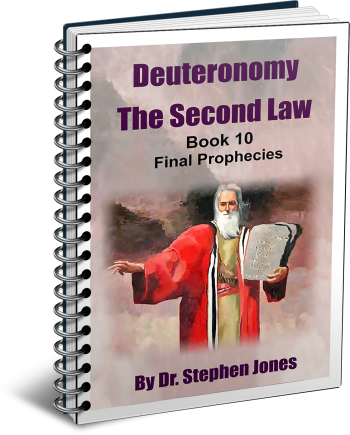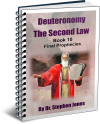Latest Posts
View the latest posts in an easy-to-read list format, with filtering options.

A commentary on the tenth speech of Moses in Deuteronomy 32-34. The book of Deuteronomy is a series of 12 speeches that Moses gave just before his death at the end of Israel's wilderness journey.
Category - Bible Commentaries

After we are given the lyric for Moses’ song, we read in Deut. 32:44-47,
44 Then Moses came and spoke [dabar, “speak, converse, sing”] all the words of this song in the hearing of all the people, he, with Joshua the son of Nun.
We should understand this to say that Moses “came and sang all the words of this song.” The Hebrew word dabar also means “to sing,” and is so translated later in Judges 5:12, where the Song of Deborah reads, “Awake, awake, sing a song!”
It appears that Moses first taught Joshua this song, and that they sang a duet to teach it to the rest of the people. In this verse, the Hebrew text spells Joshua’s name as Hoshea. Both forms are from the same Hebrew root word, yasha, “salvation.” It should be noted that the Song of Moses connects more to Hosea than to any other prophet. Perhaps it is because Joshua and Hosea are virtually the same name.
45 When Moses had finished speaking all these words to all Israel, 46 he said to them, “Take to your heart all the words with which I am warning you today, which you shall command your sons to observe carefully, even all the words of this law. 47 For it is not an idle [reyk, “empty, vain, worthless”] word for you; indeed, it is your life.”
As we have seen, the Song of Moses shows how Israel would follow the path of death by their inability to keep their vow made under the Old Covenant. But in the last half of the Song we are also shown the path of life under the New Covenant, as God fulfills His oath of deliverance and salvation.
This two-step process (death and life) is also reflected in Moses and Joshua themselves, for Moses could not bring Israel deliverance. He could lead them out of Egypt as a type of Christ our Passover, but he would have to leave it to Joshua to be the type of Christ in His second appearance to lead us into the Kingdom. Moses had a wilderness ministry, but in the end he had to defer to Joshua to bring them “salvation,” as his name indicates.
Joshua, or “Hoshea,” was the son of Nun (???), “fish, posterity” as in a swarm, teeming with life. Hence, Moses says of this song, “it is your life,” in order to connect that life with Joshua, son of life. And since Joshua was a type of Yeshua, the Christ, we read also in John 1:4 that “in Him was life, and the life was the light of men.” Moses continues,
47 … And by this word [or song] you shall prolong your days in the land, which you are about to cross the Jordan to possess.”
When Moses spoke of “life,” he prophesied often of immortal life, especially when he talked about prolonging one’s life in the land. For example, Paul says in Rom. 10:5,
5 For Moses writes that the man who practices the righteousness which is based on law shall live by that righteousness.
He was not talking only about one’s daily life or a life span, but rather that Moses was telling Israel that if they could fulfill the law perfectly, they would attain immortality through “that righteousness” which comes from their own works. In other words, the Old Covenant might have led them into immortal life, if they had been able to keep their vow. We see this again in Lev. 18:5, which says,
5 So you shall keep My statutes and My judgments, by which a man may live if he does them; I am the Lord.
Of course, Paul’s point was that “all have sinned” (Rom. 3:23), and therefore, “there is none righteous, not even one” (Rom. 3:10). Hence, we are in need of the New Covenant that is based on the righteousness of God—that is, His ability to keep His oath and to make us righteous by the work of the Spirit in our hearts, received by faith.
This was prophesied in Hab. 2:4, “the righteous will live by his faith.” Paul quotes this as well in Rom. 1:17 and again in Gal. 3:11.
The people in Moses’ day were to have faith in Joshua, who alone was called to lead them into the Promised Land. Likewise, under the New Covenant, Acts 4:12 says,
12 And there is salvation [“Yeshua, or Joshua”] in no one else; for there is no other name under heaven that has been given among men, by which we must be saved.
When Moses commissioned Joshua to lead Israel into the Promised Land, he established Yeshua-Jesus as his ultimate successor in leading people into immortality. He made it very clear that the people would not and could not keep their vow in Exodus 19:8, but that they would need a second covenant to fulfill the purposes of God.
48 And the Lord spoke to Moses that very same day, saying, 49 Go up to this mountain of Abarim, Mount Nebo, which is in the land of Moab opposite Jericho, and look at the land of Canaan, which I am giving to the sons of Israel for a possession. 50 Then die on the mountain where you ascend, and be gathered to your people, as Aaron your brother died on Mount Hor and was gathered to His people.
Moses already knew that he was going to die (Deut. 31:16). That is why he had commissioned Joshua to take his place. But after he taught the Song to the people, the same day he was shown the manner of his death. That was when he received instructions that he was to die on Mount Nebo, which was in the mountain range of Abarim.
Abarim means “Regions Beyond,” because it was situated beyond the Jordan River. It is the plural of the word abar, or Eber, the man who gave the Hebrews their name (Gen. 11:15). Hence, in Gen. 14:13 we read of “Abram the Hebrew” (ibriy, “of Eber”). The word properly means “Hebrew, an immigrant, one who passes beyond.”
The book of Hebrews is thus a book about immigration from the Old Covenant to the New Covenant. It gives the path by which we may pass beyond the Old Jerusalem, its temple, its sacrifices and priesthood that were all established under Moses. We are now to follow Joshua-Yeshua-Jesus into the Promised Land.
Even though Moses was not allowed to enter the land of Canaan, causing some even to question his salvation, we see that his death in the mountain range of Abirim reveals his heart as one who was able to pass from the Old Covenant to the New. Certainly, he accepted Joshua’s calling, for he was the one to commission him, so this pictures him as a believer in Jesus Christ who fully accepted the change from one covenant to the next.
Specifically, Moses was to die in Mount Nebo, one of the prominent peaks of Abarim. Nebo is not a Hebrew word, but is akin to nabiy, “prophet.” Gesenius Lexicon gives its primary meaning as “prophet,” but secondarily as,
“a Babylonian deity who presided over learning and letters; corresponds to Greek Hermes, Latin Mercury, and Egyptian Thoth.”
The symbolism, then, points to Moses as a type of the Old Covenant, one who learns the law, but in the end fails to keep it. Perhaps also this is what Paul had in mind when he wrote of the Old Covenant in 2 Cor. 3:7 as being “the ministry of death, in letters engraved on stones.” By contrast, Paul says in verses 2 and 3,
2 You are our letter, written in our hearts, and read by all men; 3 being manifested that you are a letter of Christ, cared for by us, written not with ink, but with the Spirit of the living God, not on tablets of stone, but on tablets of human hearts.
Moses first offered Israel the opportunity to hear the law directly by the voice of God in order that the law might be written on their hearts (Exodus 20:18-21). However, they refused on account of their fear, and so the law was passed to them on tablets of stone. As an external law, imposed as a discipline upon their flesh, they would fail to receive immortal life from it. But Yeshua-Jesus is the Mediator of the New Covenant, by which we ourselves are His “letter,” with the law being written on “tablets of human hearts.”
In Deut. 32:51, 52 God told Moses the specific reason Moses could not enter the Promised Land:
51 because you broke faith [ma’al] with Me in the midst of the sons of Israel at the waters of Meribah-kadesh, in the wilderness of Zin, because you did not treat Me as holy in the midst of the sons of Israel. 52 For you shall see the land at a distance, but you shall not go there, into the land which I am giving the sons of Israel.
That story is told in Numbers 20, where Moses was supposed to speak to the rock to bring forth its water for the people. Earlier, in Exodus 17:6, Moses was told to strike the rock to receive the water. The problem was that he struck the rock on both occasions.
These two incidents were meant to prophesy of the two works of Christ. Christ’s first appearance saw Him “smitten of God and afflicted” (Isaiah 53:4) in order to die for the sins of the people. But the second appearance is a preaching or teaching work, not a death work. So Moses was supposed to speak to the rock. Here is where he failed, for he struck the rock again
It is as if his calling could not take him beyond the first work of Christ into the second. He was too focused upon Passover to manifest the feast of Tabernacles. For this reason, he could not lead Israel into the Kingdom, which is the purpose of the second work of Christ.
When this event occurred, God told Moses in Num. 20:12,
12 … Because you have not believed [aman, “faith, to believe”] Me, to treat Me as holy in the sight of the sons of Israel, therefore you shall not bring this assembly into the land which I have given them.
Moses’ problem was lack of aman, “faith,” which is the great barrier to any man’s entrance into the Kingdom. But later, in Deut. 32:51 the wording tells us that Moses’ problem was ma’al, “to act treacherously or unfaithfully.”
The word ma’al (???) is spelled mem-ayin-lamed. Mem (?) is water or chaos; ayin (?) is an eye, seeing, or manifesting; lamed (?) is an ox goad that pictures authority. The word, then, literally refers to chaos manifesting through authority. In other words, Moses used his authority to bring forth water, but chaos and disorder with it.
To this day there are various levels of chaos manifested in the teachings about the second coming of Christ. Many do not understand the difference between the two works of Christ. That topic is too lengthy for us in this study, but it is treated fully in my book, The Laws of the Second Coming.